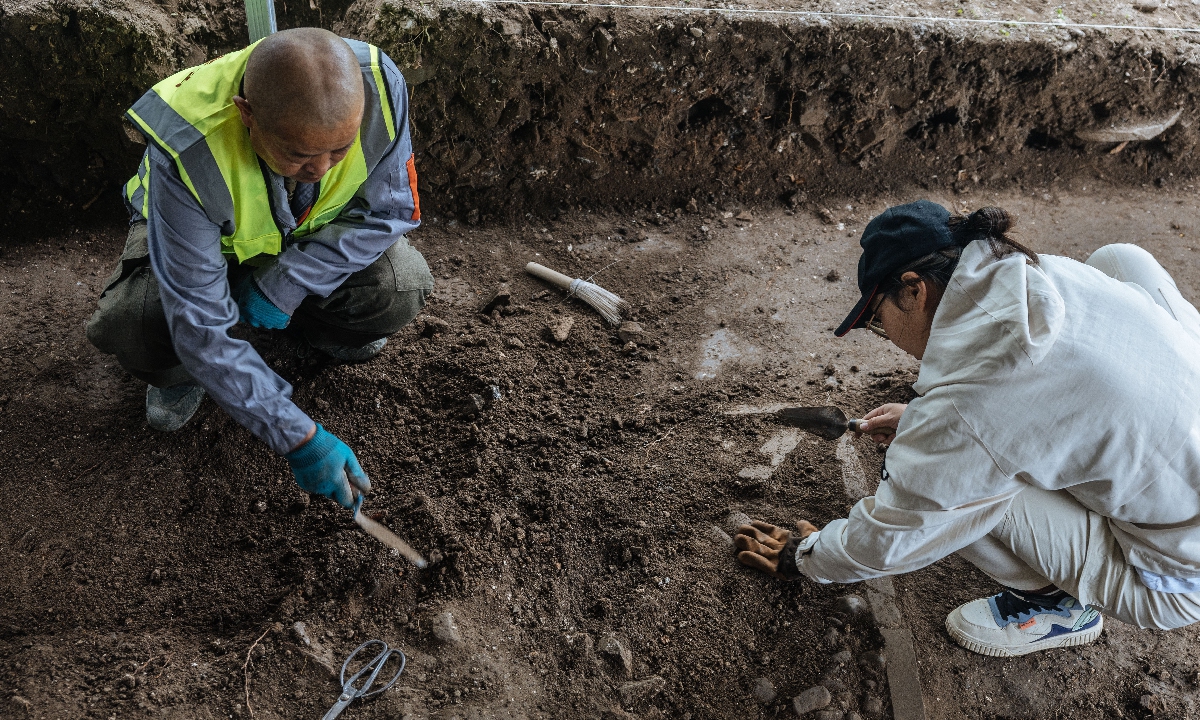ARTS / ART
Archaeological site at Beijing's Old Summer Palace holds open day

A researcher and technician work on site at the Danbo Ningjing archaeological site on September 24, 2023. Photo: Li Hao/GT
As part of the 13th Beijing Science Carnival, an open day was launched at the Danbo Ningjing archaeological site on Sunday to invite the public to appreciate the beauty of archaeology.
Danbo Ningjing, which can be literally translated as simple and calm, are ruins located in the northwest section of Beijing's Yuanmingyuan, or the Old Summer Palace. Completed in the fifth year of the Yongzheng Emperor (1727), the site is one of the 40 scenic spots in the royal garden.
Archaeologists believe the site was razed during the sacking of Yuanmingyuan in 1860 by Anglo-French allied forces during the Second Opium War (1856-60). Research institutes have launched archaeological excavations at the site since 2020.
The open day was jointly initiated by the Beijing Institute of Archaeology, the Yuanmingyuan Management Office, and the Beijing Archaeological Society. Researchers at the site told media that this archaeological excavation work has been opened to the public. Tourists have been able to stop by the site to learn about the excavation so long as they don’t disrupt the researchers and technicians who are working at the site, yet not many people knew about this.
As China marks its 20th National Science Popularization Day with a wide range of activities held from September 16 to 24, the open day aimed to draw public attention to an archaeological site that they can easily access in the city.
Local residents and students were invited to the archaeological site, meeting face-to-face with archaeological experts, to observe the excavation process. The students were intrigued by the tools showed by experts and kept asking questions. The open day was also livestreamed on Douyin, the Chinese version of TikTok.
Understanding the long history of Chinese civilization and perceiving the profoundness of Chinese culture are inseparable from archaeology. In recent years, the public's enthusiasm for the field has been rising.
To popularize archaeological knowledge and meet the needs of the people to understand archaeological discoveries, relevant research institutes have been actively sharing the process and results of archaeological work to the public through on-site observation, professional explanation, simulated archaeology, and excavation livestreams, receiving support and encouragement from all walks of life, Zhang Zhonghua from the Beijing Archaeological Research Institute introduced.
“The main purpose of holding the open day as well as livestreaming is to allow the general public to understand archaeology and to abetter ppreciate the treasures of Chinese culture. At the same time, it lifts the veil of mystery that hangs over archaeology and allows the public to understand the daily work of archaeologists. The frontline archaeologists of today will eventually age, and if the children and young students who participate in the event develop a passion for archaeology and choose to major in this field, it would also be considered a contribution to the inheritance of our country's archaeological undertakings,” Zhang told the Global Times.
